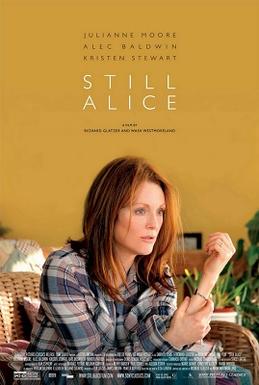Saturday, January 24, 2015
FILM: Still Alice
Still Alice features a heart-wrenching performance by Julianne Moore portraying a smart, successful woman in her 50s struck with early onset Alzheimer’s disease. The film captures her experience and the impact to her husband (Alec Baldwin) and three grown children (Kristin Stewart, Kate Bosworth, Hunter Parrish). Moore’s performance combine with subtle, skillful direction, cinematography, score, and make-up to give subjective impact to the main character’s decline. In some scenes to visualize her disorientation, the focal length tightens so that she is sharp while the world around her blurs. In one scene, where she’s been running and suddenly finds herself lost on what should be the familiar ground of the university campus where she teaches, her panic becomes palpable as the focus tightens and the sound zeroes in on her sharp intakes of breath. In some scenes, the score by a string ensemble subtly deconstructs, to where the strings are just slightly out of synch in time or wavering in tune, not dissonant but kind of the sound of an orchestra tuning before the performance starts. In another scene, where she is viewing a video that her past self has recorded for her future self, the video of her past self is in crisp focus, clear voice, and sharp colors, while her actual present self is subtly muted in color and less distinct. All of these elements of film craft are skillfully combined to great effect to convey her experience. The main character gives a powerful speech at the center of the film, but unlike other works with heavy-handed speeches inserted into the book (Atlas Shrugged, for example), the speech scene is moving and integral to the story. Bring Kleenex, but do see this film (unless the subject is too close to home, in which case a pass is completely understandable). Julianne Moore is squarely in Best Actress territory here, and I’d also call out Kristin Stewart’s performance as one of the daughters, and the co-writer/director team of Wash Westmoreland and Richard Glatzer (who also brought us the wonderful Quinceañera).
Subscribe to:
Post Comments (Atom)


No comments:
Post a Comment